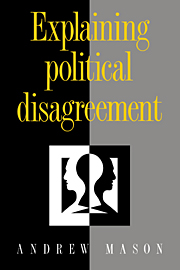Book contents
- Frontmatter
- Contents
- Preface
- Acknowledgements
- Introduction
- 1 Differences in values
- 2 The notion of an essentially contested concept
- 3 The miscommunication thesis
- 4 Integrating rational and non-rational explanations
- 5 A model for explaining some moral and political differences
- Concluding remarks
- Appendix
- Bibliography
- Index
2 - The notion of an essentially contested concept
Published online by Cambridge University Press: 18 December 2009
- Frontmatter
- Contents
- Preface
- Acknowledgements
- Introduction
- 1 Differences in values
- 2 The notion of an essentially contested concept
- 3 The miscommunication thesis
- 4 Integrating rational and non-rational explanations
- 5 A model for explaining some moral and political differences
- Concluding remarks
- Appendix
- Bibliography
- Index
Summary
The thesis that key political concepts are essentially contested appears to be a self-conscious version of the contestability conception of how political disagreement is to be explained: W. B. Gallie introduced the notion of an essentially contested concept by saying that they are concepts whose nature it is to be open to endless dispute. Many have regarded the notion as a fruitful one, and some of them have thought that it provides an explanation for the intractability of disputes over the correct application of central social and political terms amongst professional theorists and others. I shall defend the thesis that key political concepts are essentially contested against some influential criticisms and shall argue that it contains insights about the nature of political disagreement. In its most defensible form, however, it does not constitute a genuine version of the contestability conception because in that form it does not deny that there may be uniquely correct interpretations of essentially contested concepts. Understood in the way I propose, essential contestedness theses combine elements from the imperfection and contestability conceptions: they hold that there is room for reasonable disagreement over the proper interpretation of key political concepts but argue that one particular interpretation may nevertheless be correct and the others mistaken.
- Type
- Chapter
- Information
- Explaining Political Disagreement , pp. 47 - 68Publisher: Cambridge University PressPrint publication year: 1993



